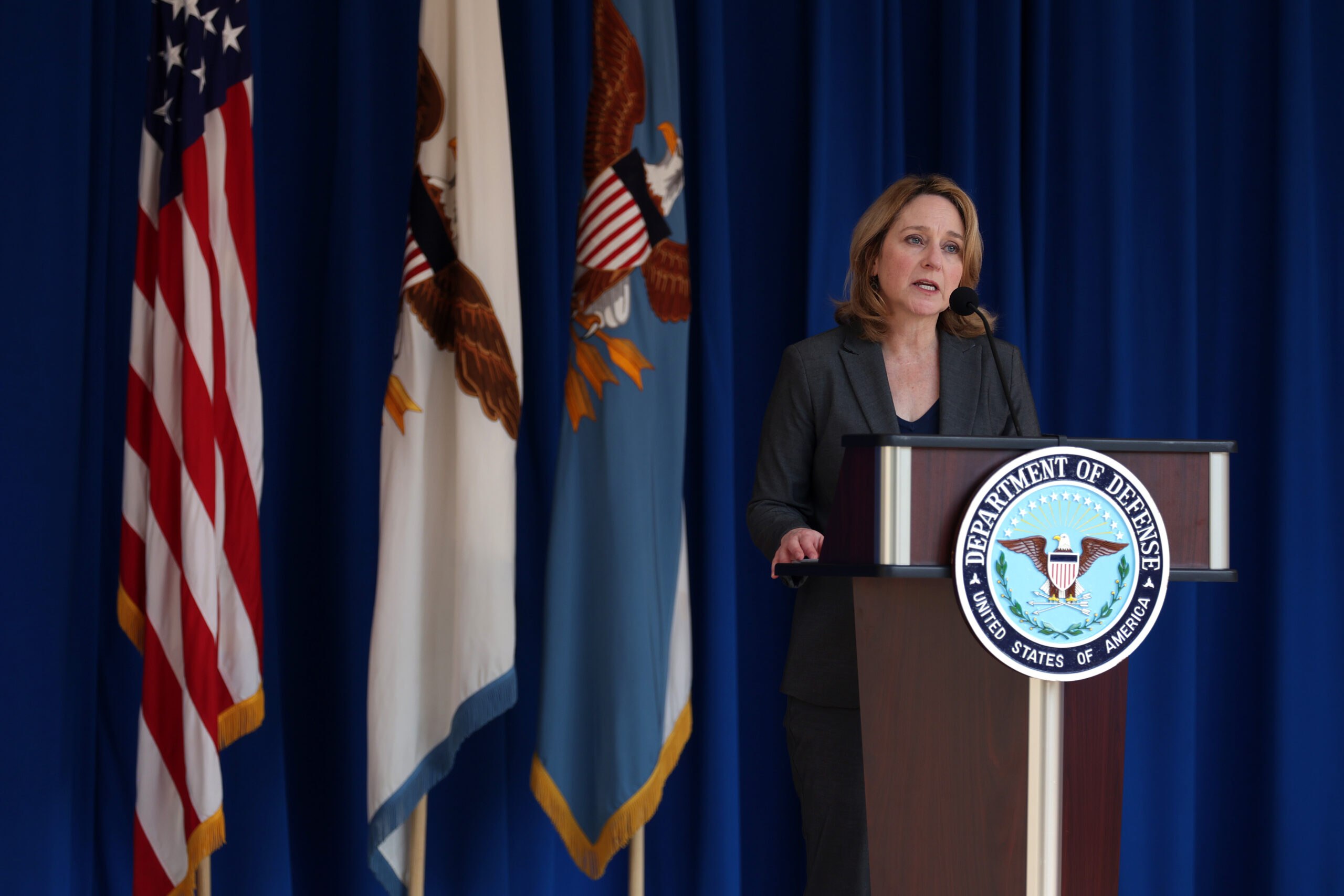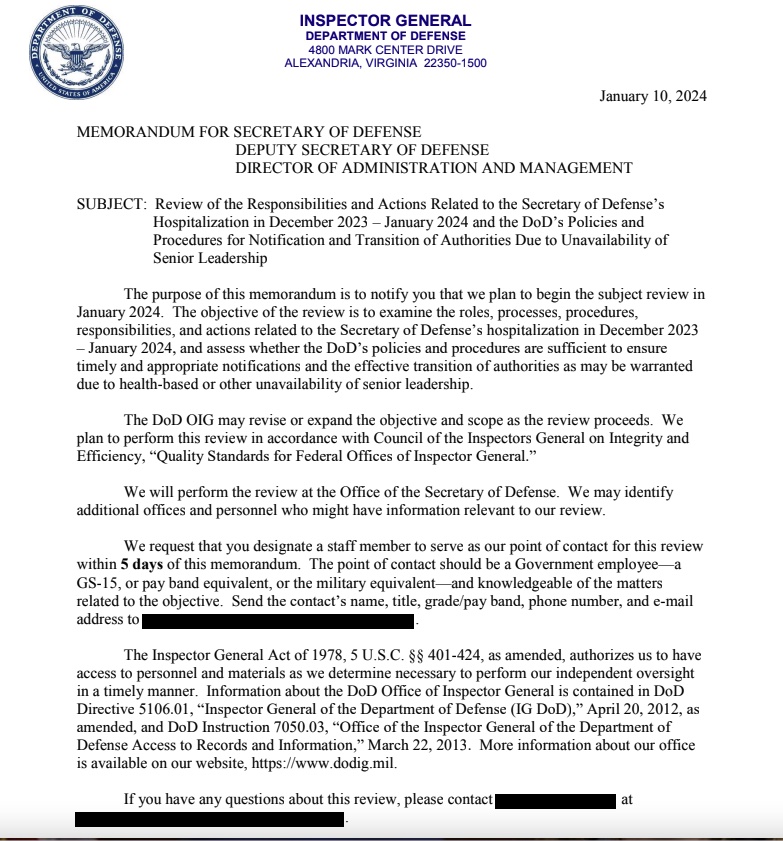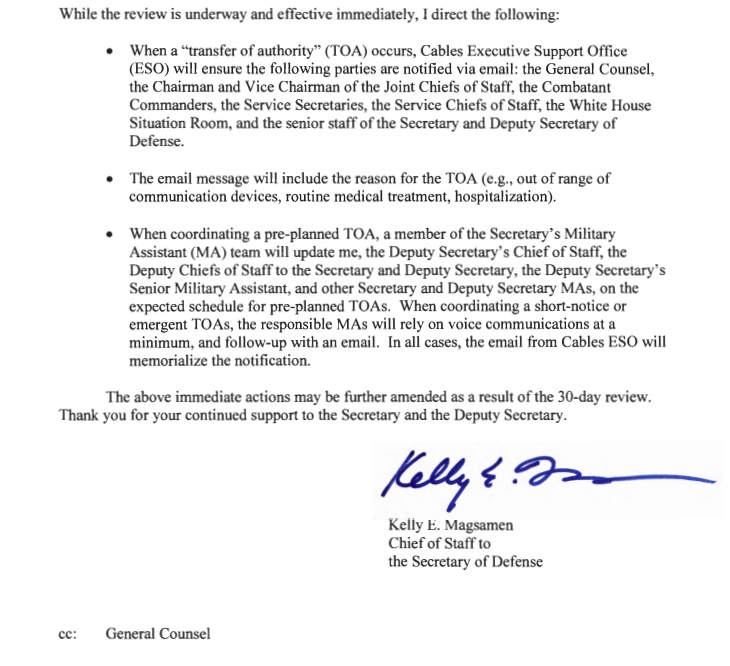A week after the Pentagon first revealed that Defense Secretary Lloyd Austin, 70, had been hospitalized, serious questions remain about the transfer of his authorities to his top deputy. Several reviews are underway to find out why there was limited notification about that transfer and how much Deputy Defense Secretary Kathleen Hicks knew about the situation.
On Jan. 2, Hicks was notified by officials at the Pentagon while she was vacationing with her family in Puerto Rico that she would be acting as defense secretary and given the authority to do so. However, it would not be until Jan. 4 that she, along with President Joe Biden, the National Security Council and other top leaders would learn that the reason for the transfer was because Austin was hospitalized on Jan. 1. Congress and the public would not find out until Jan. 5.
Adding to the confusion, Austin’s Chief of Staff, Kelly Magsamen was out with the flu Jan. 2, Ryder said during a press briefing yesterday, and did not notify anyone outside of Austin’s team about his hospitalization until Jan. 4.

The Pentagon says such transfers are not unprecedented and, according to The Wall Street Journal, Hicks didn’t ask why. However, in the wake of revelations that Austin was hospitalized after complications from prostate cancer surgery, much of that transfer remains shrouded in mystery. Why didn’t Hicks ask why she was being given those authorities? How much was Hicks initially told? How long was the initial authorization for transfer? How frequently was it updated given the 48 hours that elapsed between the time Hicks first received the authorities and her being notified that Austin was hospitalized? Why was the White House not notified about the transfer until Thursday?
Asked by The War Zone whether Hicks was aware that she was being thrust into the role of, among other things, one of President Joe Biden’s key advisors on the use of nuclear weapons, the Pentagon offered the following response Thursday morning:
“This transfer occurs from time to time and is not tied chiefly to health-related matters,” a U.S. defense official said in an email. “The Deputy Secretary keeps a complete suite of communications and capable staff with her at all times, regardless of geographic location.”

The Pentagon declined comment Thursday morning about the assertion that Hicks didn’t ask about why the powers were transferred or how often that transfer was updated, pending the outcome of internal reviews of the matter. The Pentagon also declined to make Hicks available for comment on this situation.
During his Thursday afternoon press briefing, Air Force Maj. Gen. Pat Ryder, the Pentagon’s top spokesman, declined to address specifics about the transfer on the basis of “operational security reasons.”
“She has access to full communications that are needed in order to make those decisions,” he said, speaking in general terms. “At no time during the situation, was there any gap in command and control for the Department of Defense. At all times, national security was in good hands and the secretary or deputy secretary were at the helm.”
While House National Security Council spokesman John Kirby said Thursday that while this incident of an unreported hospitalization cannot be repeated, there is no plan to have more intensive tracking of cabinet members.
“We’re not going to track the GPS coordinates on somebody’s mobile phone in the administration and we’re not going to plant a microchip in their neck like they’re a poodle,” he said in the exchange below, when asked why cabinet members are not tracked more closely than the city they are in. This is a somewhat fascinating detail because these officials, especially the Defense Secretary have critical roles to play in so-called continuity of government operations. The idea that their exact whereabouts is known about at all times is a unique admission.
On Monday, the Pentagon authorized a review “to identify the relevant facts and circumstances during this period and evaluate the processes and procedures through which the Deputy Secretary of Defense was notified that she should to carry out the functions and duties of the Secretary of Defense.”
Thursday, a separate review of the incident was launched by the Defense Department Office of Inspector General. (DoDIG). The office wants “to examine the roles, processes, procedures, responsibilities, and actions related to the Secretary of Defense’s hospitalization in December 2023 – January 2024, and assess whether the DoD’s policies and procedures are sufficient to ensure timely and appropriate notifications and the effective transition of authorities as may be warranted due to health-based or other unavailability of senior leadership.”

The reviews come after widespread outrage about the lack of notification that Austin had been taken by ambulance to Walter Reed National Military Medical Center on Jan. 1 and later admitted to their intensive care unit. It would not be until Jan. 9 that Biden learned Austin was being treated for cancer.
“Secretary Austin remains hospitalized and is in good condition,” Ryder told The War Zone on Friday. “We do not have a specific date for his release from the hospital at this time but will continue to provide daily updates until then.”
He resumed his authorities a week ago and issued a statement Thursday night about the retaliatory strikes on Houthi targets in Yemen.
Austin “gave the CENTCOM commander the order to execute the strikes and then he monitored them from his from his hospital room in real time, via a full suite of secure communication capabilities,” Ryder told reporters, including from The War Zone, at a briefing Friday. “And in following those strikes, conducted a call with National Security Council the chairman and the Central Command commander for initial post strike assessment.”
Though reviews are underway and many questions remain, there is one solid result to come out of this.
The Pentagon on Monday ordered that moving forward, when a transfer of authority occurs, notifications will go out to the White House Situation Room, Joint Chiefs of Staff, service secretaries, combatant commanders and senior staff of the defense secretary and deputy defense secretary. Those notifications will include the reason for the transfer.

While the Pentagon maintains that at no time was national security endangered by the lack of notification about Austin’s health issues, the lack of transparency raises serious questions about his judgment. Biden has said he won’t ask for Austin to resign and the Pentagon says Austin is not going to submit his resignation. There has been no discussion about how all this affects Hicks.
Though a dismissal may not be on the table, the White House acknowledged a breakdown in communications and moved to assert new discipline over the administration, The New York Times reported. Jeffrey D. Zients, the White House chief of staff, “ordered a review of procedures and sent a directive to cabinet secretaries making clear that they are to inform the White House when they are unable to perform their duties.”
It unknown is when Austin will be released from the hospital and return to full duty. Though he resumed his authorities last Friday, Hicks has begun filling in for him at public events. Thursday, she met with Bulgarian Minister of Defense Todor Tagarev at the Pentagon “to discuss a range of regional and bilateral issues.”
It remains to be seen how much is publicly divulged about this bizarre sequence of events from the reviews currently underway. We will monitor the progress and report the findings when they are available.
Contact the author: howard@thewarzone.com
